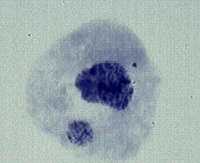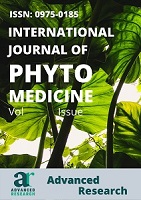Study of protective potential of Adhatoda vasica Extract against radiation induced genotoxicity: An in-vivo analysis
Keywords:
Radioprotection, Adhatoda vasica, Chromosomal aberrations, MicronucleusAbstract
In the present paper, we provide an insight of the radioprotective potential of Adhatoda vasica leaf extract. Mice bone marrow cells were used as the test system. Animals were fed with 500mg/kg body wt. and 1000mg/kg body wt. of ethanolic extract of the plant prior to 9 Gray γ-radiation exposure and chromosomal aberration assay and micronucleus assay were performed. The frequency of chromosomal aberrations and micronuclei among different treatment groups and the controls was compared. The results revealed a significant decrease in the frequency of chromosomal aberrations as well as the micronucleus possessing cells in the groups pre-treated with A. vasica extract as compared to the untreated group. Better radioprotection was observed in 1000mg/kg-body wt. dosage group as compared to 500mg/kg-body-wt. dosage group. These findings were suggestive of radioprotective potential of A. vasica leaf extract.
References
. Delaney G et al. (2005). The role of
radiotherapy in cancer treatment:
Estimating optimal utilization from a
review of evidence-based clinical
guidelines. Cancer, 2005;104:1129–
. The Swedish Council on Technology
Assessment in Health Care (SBU).
Systematic Overview of Radiotherapy
for Cancer including a Prospective
Survey of Radiotherapy Practice in
Sweden 2001 – Summary and
Conclusions. Acta Oncologica,
;42:357–365.
. Uma Devi P, Rao BSS, Nagarathnam
A. Introduction to radiation biology. BI
Livingstone Pvt. Ltd. 2000;5:65
. Emerit I., Oganesian N., Sarkisian T.,
Arutuyunyan R., Pogosian A., Asrian
K., Levy A., and Cernjavski L.
Radiation-induced clastogen factors:
Anticlastogenic effects of Gingko
biloba. Free Radic. Biol. Med.,
;18:985-991.
. Ganasoundari A., Uma Devi P., and
Roa M. N. A. Protection against
radiation-indused chromosome
damage in mouse bone marrow by
Ocimum sanctum. Mutat. Res,
;373:271-279.
. Kumar M., Sharma M. K., Saxena P.
S., and Kumar A. Radioprotective
effect of Panax ginseng on the
phosphatases and lipid peroxidation
level in testes of Swiss albino mice.
Biol. Pharm. Bull, 2003;26:308-312.
. Goel H. C., Prasad J., Singh S., Sagar
R. K., Agrawala P. K., Bala M., Sinha
A. K. and Dogra R. Radioprotective
potential of herbal extract of Tinospora
cordifolia. J. Radiat. Res. 2004;45:61-
. Singh I., Sharma A., Nunia V. and
Goyal P. K. Radioprotection of Swiss
albino mice by Emblica officinalis.
Phytother. Res. 2005;19:444-446.
. Sunila E. S. and Kuttan G. Protective
effect of Piper longum fruit ethanolic
extract on radiation-induced damages
in mice: A preliminary study.
Fitoterapia. 2005;76:649-655.
. Samarth R. M. and Goyal A. Mentha
piperita (Linn.) leaf extract provides
protection against radiation indeuced
chromosomal damage in bone marrow
of mice. Indian J. Exp. Biol.
;41:229-237.
. Jagetia G. C., Baliga M. S., Venkatesh
P. and Ulloor J. N. Influence of ginger
rizhome (Zingiber officinale Rosc) on
survival, glutathione and lipid
peroxidation in mice after whole-body
exposure to gamma radiation. Radiat.
Res. 2003;160:584-592.
. Wealth of India. Raw Materials. Council
Sci. Ind. Res., New Delhi, India1989.
. Dorsch, W. and Wagner, H. New
antiasthmatic drugs from traditional
medicine. Int. Arch. Allergy Appl.
Immunol. 1991;94:262–265.
. Nath, D., Sethi, N., Singh, R.K., and
Jain, A.K. Commonly used Indian
abortifacient plants with special
reference to their teratologic effects in
rats. J. Ethnopharmacol. 1992;36:147–
. Grange, J.M. and Snell, N.J., Activity of
bromhexine and ambroxol,
semisynthetic Emertuberculosis in vitro.
J. Ethnopharmacol. 1996;50: 49–53.
. Kumar Meenal, et al,. Protective Effect
of Adhatoda vascia Nees Against
Radiation-Induced Damage at Cellular,
Biochemical and Chromosomal Levels
in Swiss Albino Mice. eCAM
;4(3)
. Preston R. J., Dean B. J., Galloway A.
F., Mcfee Sheldy Mammalian in vivo
cytogenic assay analysis of
chromosomal aberration in bone
marrow cells. Mutat Res.
;189:157-165.
. Seabright, M.. A rapid banding
technique for human chromosomes.
Lancet 1971;2:971-972.
. Kumar A., Ram J., Samarth R. M., and
Kumar M. Modulatory influence of
Adhatoda vasica Nees leaf extract
against gamma irradiation in Swiss
albino mice. Phytomedicine
;12:285–293
. Hall, E.J. In: Radiobiology for the
Radiologists, second ed. Harper & Row
Publishers, Philadelphia1978.
. Biaglow, J.E., Varnes, M.E., Epp, E.R.,
Clark, E.P. In: Cerrutti, P.A., Nygaard,
O.F., Simic, M.G. (Eds.),
Anticarcinogenesis and Radiation
Protection, vol. 387. Plennum Press,
New York1987.



